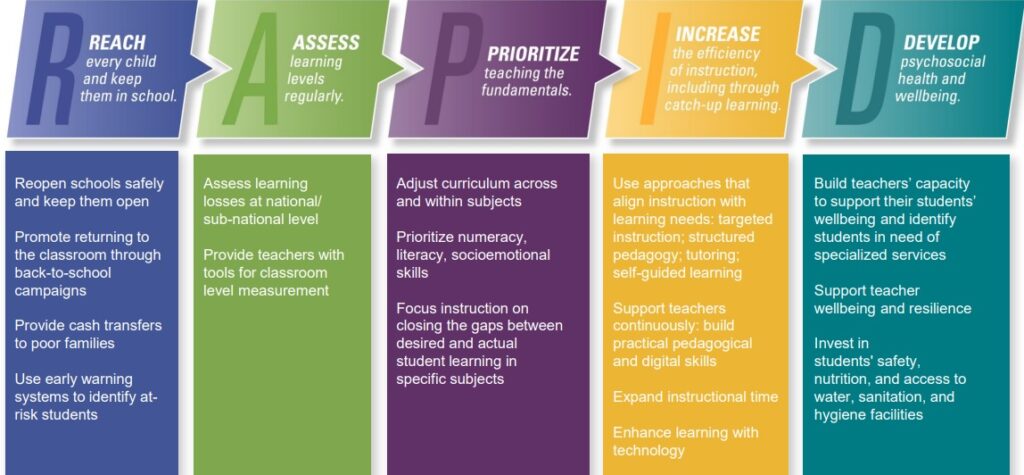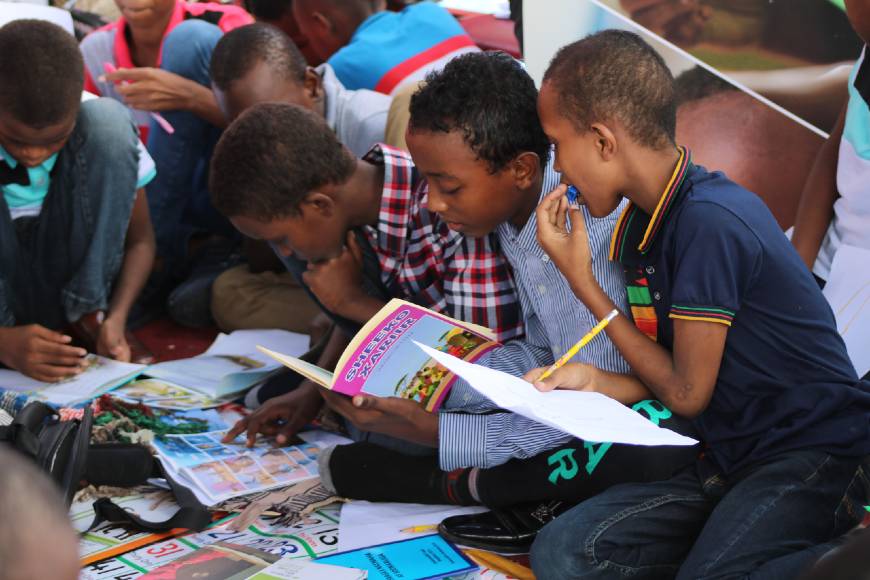The RAPID Framework
The World Bank together with several partners (see Attribution below) developed a policy framework to guide decision makers to reversing learning losses arising from the COVID pandemic.
The policy framework entitled R.A.P.I.D., is based on five evidence-based policy actions:
- Reach all children
- Assess learning
- Prioritize the fundamentals
- Increase the efficiency of instruction
- Develop psychosocial health and wellbeing
The first two policy actions (i.e., reaching and keeping students in school, and assessing learning levels regularly) are primarily designed to support recovery, and the remaining three policy actions are strategies to improve teaching, learning, and well-being.

Source: World Bank
Winning Teams’ Response to the RAPID Framework
We are in complete agreement with the approach adopted by the World Bank, the Bill & Melinda Gates Foundation, FCDO, UNESCO, UNICEF, and USAID. The RAPID framework specifically tries to accelerate learning through non-conventional means. The Winning Teams approach is consistent with the RAPID framework, which we have successfully applied for more than two decades. The RAPID framework is based on research over many years, and is based on evidence from numerous programmes around the world, and from many countries.
There are many similarities between the RAPID approach, and the Winning Teams approach. Our approach specifically addresses:
- Assessing learning levels regularly
- Prioritising teaching the fundamentals
- Increasing the efficiency of instruction including catch-up learning
“The Winning Teams approach is consistent with the RAPID framework, which we have successfully applied for more than two decades.”
Whilst we do support education decision makers in the ‘Reach’ component, primarily by keeping learners motivated to stay in school, and the ‘Develop’ component, our approach specifically targets the classroom environment rather than the country-specific policy environment.
Assess Learning Levels Regularly
The framework provides for both system-level and classroom-level learning assessment. System level assessments are primarily aimed at a national or regional level, and the baseline measures of learning can help policymakers understand the scale of the learning challenge, trends in learning over time, and inequalities in student learning.
Winning Teams provides continuous learning level assessments at the classroom and school level. It is vital to have quality classroom level data about the performance of students. Classroom assessments are critical to implement recovery strategies like targeted instruction, which groups students by their learning levels, and for monitoring the effectiveness of learning recovery interventions. Winning Teams uses a continuous motivating, and non-threatening learning assessment methodology.
Prioritise Teaching the Fundamentals
The pandemic-related education disruptions have left learners behind their grade-appropriate learning levels. Strictly adhering to the curriculum risks presenting learners with material they are not prepared to learn. If they move through the curriculum without first mastering the key foundational concepts they need, their ability to progress on to more complex topics with adequate understanding will be jeopardized.
The Winning Teams approach focuses on learners mastering key foundational skills through several mechanisms. This is not a definitive list, but it is in alignment with the RAPID framework:
- Focusing on key competencies within these focus areas
- Streamlining duplicate content
- Integrating topics based on logical connections
- Providing a motivating environment in which to learn
- Providing learner and teacher guides focusing on foundational knowledge
Increase the Efficiency of Instruction, Including Through Catch-Up Learning
To recover from learning losses, schools will need to support initiatives that increase the amount of learning within classrooms, through more effective teaching practices and learner-focused recovery strategies that can help all students make gains on their learning. Improving the quality of teaching and targeting it to the level of the student are among the most crucial interventions for reversing the decline in learning progress.
“The pandemic has left learners with learning gaps which have to be met with ‘catch-up’ learning initiatives”
The Winning Teams approach fully supports this policy objective through
- Targeted instruction
- Self-guided learning
- Structured learning
- Tutoring
Specifically, we help align instruction to the learning levels of students. We provide material support that helps direct self-guided learning, including high-quality teaching and learning materials, peer coaching, and continuous learner assessment. We also use a peer tutoring system using more advanced learners in small-group environments, which gives individualized attention and targeted instruction in areas where learners need further support or practice.
The key takeaway is that the pandemic has left learners with learning gaps that have to be met with ‘catch-up’ learning initiatives so that they are able to progress further in more complicated areas.
Attribution
World Bank, the Bill & Melinda Gates Foundation, FCDO, UNESCO, UNICEF, and USAID. 2022. Guide for Learning
Recovery and Acceleration: Using the RAPID Framework to Address COVID-19 Learning Losses and Build Forward Better. Washington, DC: World Bank.
https://www.worldbank.org/en/topic/education/publication/the-rapid-framework-and-a-guide-for-learning-recovery-and-acceleration

0 Comments